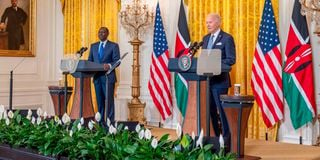Kenya scrambles to secure crucial US trade pact as election looms

President William Ruto and US President Joe Biden during a joint Press Conference at the White House, Washington DC.
What you need to know:
- The US government also views Kenya as a strategic partner in the region more broadly; Kenya is a major beneficiary of US security and foreign assistance, acts as a hub for US security initiatives in the region, and hosts the largest US embassy in sub-Saharan Africa (SSA).
- President Biden hosted Kenyan President William Ruto for a State Visit on May 23.
Kenya is facing a race against time to conclude a crucial trade deal with the US to avoid falling back to square zero once a new party takes power in Washington.
After the seventh round of negotiations last week, The EastAfrican understands that none of the 11 chapters envisioned in the Strategic Trade and Investment Partnership (STIP) agreement are complete. The US is due to hold presidential elections on November 5, pitting Kamala Harris of the Democratic Party against Donald Trump of the Republican Party.
And while a win for Kamala Harris may signal continuity for Democrats, she didn’t start the STIP as it was authorised by Joe Biden, who will not be defending his seat.
Harris' views on global trade are likely to be known once she is endorsed after the Democratic Convention on August 19. But she has in the past disagreed with Biden’s.
When she was a senator in 2016, she expressed doubts about free trade and even opposed one trade pact endorsed by Barack Obama, whose Vice-President was Joe Biden.
But she has also argued she is not a protectionist like Trump but vouches for trade deals that protect Americans and their standards.
Trump on his part has called for taxing imports and limiting control of investors from abroad, targeting Chinese ventures into the US, especially. With his ‘Make America Great Again (MAGA) slogan, he supported more bilateral deals than open global trade.
During his first term as President, he had launched negotiations with Kenya for a free trade agreement (FTA). Biden stopped that and launched talks for STIP in October 2022.
Now ahead of elections, Nairobi faces uncertainty on whether it would fall back to FTA talks or complete the STIP. Both leaders may yet change their minds and launch something completely new.
“That one will be best answered by the team negotiator from the US side. Because that is not part of what we are doing,” said Alfred K’Ombudo, Kenya’s Principal Secretary for Trade.
He, however, confirmed that none of the chapters have been completed, even though each round of talks has often focused on new areas of trade policy.
“We are negotiating the US-Kenya Strategic Trade and Investment Partnership (STIP) under the ‘single endeavour principle’ where ‘nothing is complete until everything is complete,” said K’Ombudo.
“This is because certain things can develop in one chapter that can affect other chapters. So the chapters are interrelated and therefore will only be concluded when all chapters are completed.”
Launched in July 2022, STIP was supposed to be a “high standard commitment” in a wide range of areas meant to increase investment; promote sustainable and inclusive economic growth; benefit workers, consumers, and businesses, and support African regional economic integration.
The 11 chapters were to focus on agriculture, anti-corruption, digital trade, environment, climate action, good regulatory practices, and micro, small, and medium-sized enterprises. The STIP was also supposed to address workers’ rights and protections, participation of women, youth, and others in the trade, standards collaboration, trade facilitation and customs procedures, and services domestic regulation.
Kenya and the US held the seventh round of negotiations on August 5 under the US-Kenya Stip where eight chapters were discussed.
The negotiations are co-chaired by Assistant US Trade Representative Constance Hamilton and Kenya’s Trade Principal Secretary Alfred K’Ombudo.
The United States and Kenya primarily exchanged views on the texts that concern eight chapters including agriculture; customs, trade facilitation, and enforcement; environment; good regulatory practices; inclusivity; and workers’ rights and protections.
“In September, we shall have another round of negotiations on areas that will not have been covered in August. We are looking before the end of the year to have concluded the negotiations,” said Salim Mvurya, Cabinet Secretary for Investment, Trade and Investment.
“We will have an elevated team for the next negotiations that will be held next month in the US. And I will be leading that team, as well as another elevated team from the US, who will work with us to conclude the negotiations.”
The two countries say they are moving with speed to conclude the trade negotiations ahead of the November presidential polls, to avoid jitters of signing the trade deal under a new administration in January 2025.
But that will depend on who wins the 2024 United States presidential election as they could decide to cancel the whole document.
The US is known to change trade pacts whenever political leadership changes hands between the Democrats and the Republicans.
In 2020, Trump began free trade agreement (FTA) negotiations with then-President Uhuru Kenyatta’s administration in Kenya. The Joe Biden Administration did not continue the FTA talks; it instead launched STIP.
During the recent trade negotiations, the US tabled proposed text on customs, trade facilitation, and enforcement that ensures transparency and predictability, streamlines border procedures, cuts red tape, and enhances customs enforcement.
The proposal is designed to achieve these goals by focusing on online publication, automation, reducing formalities, requiring innovative border processes, and cooperation including enforcement.
Kenya’s Trade CS Mvurya said the US team paid a visit to the port of Mombasa as part of the ongoing negotiations.
“On the issues of customs, for example, we have already been to the port of Mombasa to look at the processes and the entire processing of Customs procedures,” said Mvurya.
Predictability for traders is reflected in commitments to maintain uniform procedures on the issuance of advance rulings and to ensure access to administrative reviews and appeals on customs administration issues.
The proposed text on Customs seeks to streamline border procedures and cut red tape through the creation of a paperless border environment for trade in goods, reduction of formalities, and the adoption of a single window system that would enable electronic submission of all documentation required of a trader.
For example, the proposed text requires customs authorities to provide, allow, and accept electronic forms and supporting documents, and to maintain a single window that enables electronic submission of these documents.
However, STIP does not address tariff barriers, as would a comprehensive FTA.
Kenya’s economic relationship with the United States centres on trade in goods. Nearly all bilateral investment activity is US foreign direct investment in Kenya, valued at $277 million in 2022.
Foreign affiliates of U. multinational firms employed 4,300 people in Kenya in 2021, the latest available data show, with total sales of $2.3 billion.
Even though Kenya is not a major US trade partner in global terms, it is one of Africa’s most dynamic economies and the second-largest beneficiary of AGOA (Africa Growth Opportunity Act by value of eligible US imports, excluding crude oil.
The US government also views Kenya as a strategic partner in the region more broadly; Kenya is a major beneficiary of US security and foreign assistance, acts as a hub for US security initiatives in the region, and hosts the largest US embassy in sub-Saharan Africa (SSA).
President Biden hosted Kenyan President William Ruto for a State Visit on May 23.
Additional Reporting by Aggrey Mutambo





